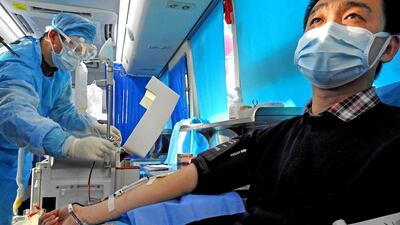An Emirati man, 29, became one of the first recovered coronavirus patients to donate his plasma to treat others still battling the virus in Abu Dhabi, it was announced on Sunday.
Sheikh Khalifa Medical City said the plasma was given intravenously to an infected patient being treated at the hospital.
Dr Fatima Al Kaabi, head of haematology and oncology, said doctors were monitoring the patient, who has moderate to severe symptoms, to test the treatment’s effectiveness.
“We are still waiting for the results of this treatment and we are optimistic that it will be promising," Dr Al Kaabi said. "We expect the patient’s condition to improve soon."
On Saturday, Dr Farida Al Hosani, spokeswoman for the UAE's health sector, said plasma treatment was being used in hospitals across the country.
Dr Al Hosani said the UAE was leaving no stone unturned to identify the best treatments and research studies to assist medical work.
That included looking into the use of the anti-malaria drug, hydroxychloroquine.
The use of plasma to treat Covid-19 was approved by the US Food and Drug Administration and has been adopted in hospitals worldwide.
Doctors have found that between 40 and 50 per cent of patients who undergo the treatment show promising results.
It is also being used in Dubai, the emirate’s health authority said on Sunday.
"There are criteria for selecting blood plasma recipients,” Dr Al Kaabi said.
Recipients must be aged between 16 and 75, and their condition must be moderate to severe.
“They must also not suffer from any health conditions that would prevent their body from accepting plasma," Dr Al Kaabi said.
"One of the most important criteria for choosing the recipient is that their blood group must match that of the donor."
Plasma can be donated at a blood bank. The blood is donated whole and the plasma is extracted.
The extracted plasma from one donation can typically be used to treat two patients.
“In the absence of a drug or vaccine against this rapidly spreading virus, we decided to expedite the use of blood plasma therapy to save those in critical situations,” said Dr Mariam Al Mazrouei, chief executive of the hospital.
The use of plasma in medical treatment dates to before the Spanish flu pandemic in 1918.
It involves using the plasma of people who have recovered from a viral infection, and therefore have antibodies in their blood that can rapidly detect and destroy the virus.
The plasma can boost their immune systems and potentially provide protection.
With only a relatively small number of patients so far treated with plasma and no formal trials under way, it is difficult to know how effective the treatment really is in this case.
But two medical teams working in separate hospitals in China gave donated plasma to 15 critically ill patients and recorded significant improvements in their symptoms.







































